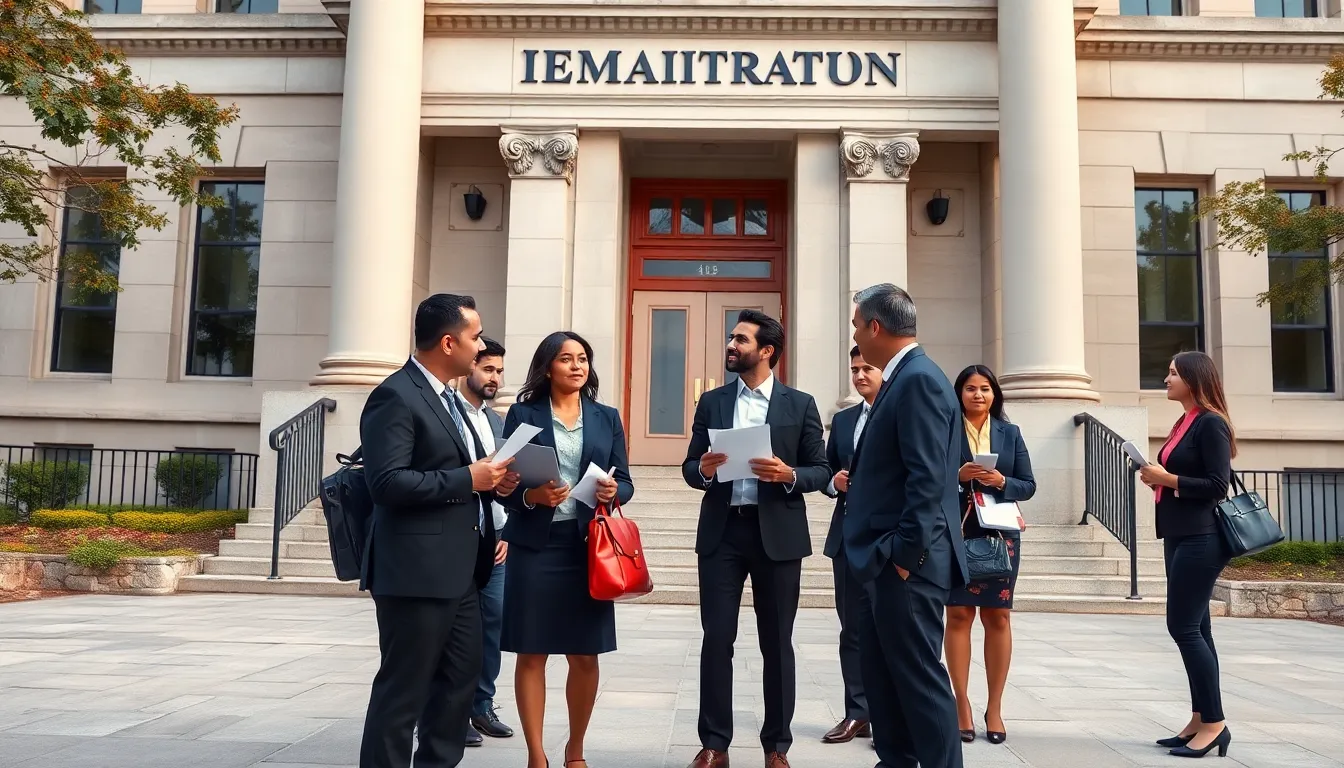Immigration law shapes the landscape of a nation, influencing who can enter, reside, and work within its borders. As global migration continues to rise, understanding these laws becomes crucial for individuals and families seeking new opportunities. Navigating the complexities of immigration can be daunting, but knowledge empowers those affected by these regulations.
From visa applications to asylum processes, immigration law encompasses a wide array of legal frameworks designed to manage the flow of people. It’s not just about policies; it’s about lives and futures. As society evolves, so too do the laws that govern immigration, reflecting changing values and priorities. This article delves into the key aspects of immigration law, offering insights that can help demystify the process and guide those on their journey toward a new beginning.
Table of Contents
ToggleOverview of Immigration Law
Immigration law governs the conditions under which individuals enter, reside, and work within a nation’s borders. This complex legal framework influences social, economic, and cultural dynamics, making it essential for individuals to understand its various components.
Historical Context
Understanding immigration law requires exploring historical developments that shaped current policies. The Immigration and Nationality Act of 1952 served as a foundational legal structure in the United States, consolidating various immigration statutes. Over time, amendments and reforms have occurred, reflecting changing societal needs and priorities. For example, the Immigration Act of 1990 introduced measures for employment-based immigration and family reunification, adapting to the demands of a global workforce.
Current Legal Framework
The current legal framework comprises statutes, regulations, and executive orders that define immigration procedures and policies. Key components include:
- Visa Categories: Various visa types, such as family-based, employment-based, and humanitarian visas, allow entry for specific purposes.
- Asylum Applications: Individuals seeking refuge from persecution may apply for asylum, which offers protection and potential permanent residency.
- Deportation Processes: Legal grounds for deportation exist, particularly for individuals violating immigration laws or committing crimes.
Understanding this framework helps individuals navigate the complexities of immigration processes. Legal assistance often proves beneficial, given the intricacies of applications and potential challenges faced during different stages of immigration.
Key Components of Immigration Law

Immigration law encompasses various critical elements, primarily focusing on visa categories and asylum processes. These components significantly impact individuals seeking legal entry and residency.
Visa Categories
Visa categories determine the eligibility for different types of immigration benefits. Key visa types include:
- Family-Sponsored Visas: These allow U.S. citizens and lawful permanent residents to bring certain family members to the United States. Spouses, children, and siblings often qualify under this category.
- Employment-Based Visas: These provide pathways for foreign workers to fill specific jobs in the U.S. Categories include H-1B for specialized occupations and L-1 for intra-company transferees.
- Student Visas: F-1 visas enable foreign students to study at accredited institutions in the U.S. These visas allow for limited work options during studies.
- Temporary Work Visas: These visas, such as H-2A for agricultural workers and H-2B for non-agricultural seasonal workers, grant employers access to foreign labor for short-term employment needs.
Understanding these visa categories is vital for applicants to select the most suitable option based on their circumstances and immigration goals.
Asylum and Refugee Status
Asylum and refugee status provide protection for individuals facing persecution. This process includes:
- Asylum Seekers: Individuals already in the U.S. can apply for asylum, claiming fear of persecution based on race, religion, nationality, political opinion, or membership in a particular social group. They must file within one year of arrival, with limited exceptions.
- Refugee Applicants: Refugees apply from outside the U.S. through the United Nations or designated agencies. They face similar persecution criteria and undergo thorough vetting processes before entering the U.S.
- Adjustment of Status: Asylum and refugee status can lead to permanent residency. Successful applicants may file for adjustment of status after one year, provided they meet specific requirements.
Navigating the complexities of asylum and refugee processes requires a clear understanding of legal criteria and procedures to ensure proper protection and eventual residency.
Enforcement of Immigration Law
Enforcement of immigration law is crucial for maintaining national security and regulating the flow of individuals across borders. Various authorities oversee and implement these laws, ensuring compliance and addressing violations.
Role of Immigration Authorities
Immigration authorities, including the U.S. Citizenship and Immigration Services (USCIS), Immigration and Customs Enforcement (ICE), and Customs and Border Protection (CBP), play essential roles in enforcement. They manage visa applications, conduct investigations, and assess eligibility for asylum or immigration relief. USCIS reviews applications for lawful permanent residency, while ICE focuses on enforcing immigration laws, often through deportation proceedings. CBP secures U.S. borders, preventing unauthorized entry and apprehending individuals attempting to cross illegally. Together, these agencies enforce immigration laws, ensuring that all actions align with national policies.
Legal Consequences of Violations
Violations of immigration law lead to significant legal consequences, including deportation and loss of future benefits. Unauthorized entry into the U.S. can result in immediate removal proceedings. Individuals with expired visas may face bans on re-entry ranging from three to ten years, depending on the duration of their unlawful presence. Criminal convictions related to immigration, such as fraudulent visa applications, can result in substantial fines or imprisonment. Understanding these consequences is critical for those navigating the complexities of immigration processes, as they underscore the importance of compliance with immigration laws.
Recent Developments in Immigration Law
Recent developments in immigration law reflect the dynamic changes in policies and judicial interpretations impacting immigrants and stakeholders. Understanding these changes provides clarity for those navigating the immigration landscape.
Legislative Changes
Congress has introduced several significant legislative changes affecting immigration law. The American Dream and Promise Act aims to provide a pathway to citizenship for individuals brought to the U.S. as children, allowing them to apply for permanent residency. Additionally, the U.S. Citizenship Act proposes comprehensive immigration reform, addressing family reunification and creating a new visa program for essential workers. These legislative efforts highlight the continued push for reform amid evolving societal attitudes towards immigration.
Court Decisions Impacting Immigration Policy
Recent court decisions have shaped the interpretation of immigration law, often leading to significant shifts in policy. In 2022, a federal court ruling reinstated Deferred Action for Childhood Arrivals (DACA), reaffirming protections for eligible undocumented youth. Furthermore, the ruling in 2023 regarding the Migrant Protection Protocols highlighted the legal challenges surrounding Title 42 expulsions, which had been used during public health emergencies. These court interpretations guide future policies and clarify the responsibilities of immigration authorities, influencing the lived experiences of many immigrants.
Challenges and Controversies
Immigration law faces numerous challenges and controversies, often influenced by public perception and human rights considerations. These factors significantly shape the ongoing debate surrounding immigration policy.
Public Opinion and Immigration Law
Public opinion on immigration law varies widely, with surveys indicating that Americans hold diverse views on immigration enforcement, pathways to citizenship, and refugee acceptance. Recent polls show that about 60% of Americans support a pathway to citizenship for undocumented immigrants, while opinions on border security hover around 70% favoring stricter measures. This divided sentiment complicates legislative efforts and fuels advocacy groups’ actions on both sides. Media representation also plays a crucial role, influencing perceptions of immigrants and driving political discourse. Events such as immigration raids and family separations further ignite public emotions, leading to protests and calls for reform. Policymakers must navigate this complex landscape, balancing legal frameworks with public sentiment to achieve sustainable immigration solutions.
Immigration Law and Human Rights
Immigration law intersects significantly with human rights issues, raising questions about the treatment of vulnerable populations. Treaties, such as the 1951 Refugee Convention, set international standards that govern the treatment of asylum seekers. However, enforcement practices often conflict with these standards, leading to legal challenges and human rights violations. Reports from organizations like Human Rights Watch highlight instances of family separations, detention conditions, and the rights of migrants experiencing violence and discrimination. Advocacy groups argue that immigration policies must prioritize human dignity and the right to seek asylum. Courts increasingly evaluate the human rights implications of immigration laws, impacting rulings on deportations, asylum eligibility, and conditions in detention centers. A continuous reevaluation of policies against human rights standards remains vital to ensuring just treatment for all individuals navigating the immigration system.
Navigating immigration law can be a daunting task filled with complexities and challenges. As policies continue to evolve it’s vital for individuals and families to stay informed about their rights and options. Legal assistance often proves invaluable in this journey ensuring compliance and understanding of the intricate processes involved.
The ongoing discussions surrounding immigration law reflect broader societal values and priorities. As communities adapt to changing demographics and global movements the importance of compassionate and just immigration policies cannot be overstated. By fostering awareness and advocacy individuals can contribute to a more equitable system that respects human dignity while addressing national interests.



